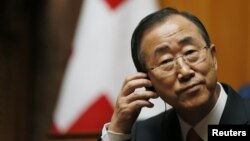UNITED NATIONS —
A United Nations internal review of its efforts to protect and assist civilians during the final stages of the Sri Lankan civil war in 2009 concludes that it was a systemic and grave failure to the detriment of thousands of civilians.
The report released Wednesday, but first reported by the BBC on Tuesday, points to failures throughout the U.N. system, starting with senior officials, but also directing blame at the U.N. Security Council, the Human Rights Council and others for not robustly responding to the escalation of violence in Sri Lanka.
U.N. Secretary-General Ban Ki-moon’s spokesman, Martin Nesirky, told reporters that Ban is committed to strengthening the United Nations and its core mission of protecting people from harm.
“As an immediate first step, the secretary-general will organize a senior-level team to give careful consideration to the recommendations and advise him on a way forward. Other action will follow in short order,” Nesirky said.
Wednesday’s report, written by former U.N. official Charles Petrie and three staff members, criticized U.N. officials for not confronting the Sri Lankan government for its responsibility in violations of international law, particularly the shelling of civilians, because it feared the government would limit its humanitarian access, which it did anyway.
In September 2009, the Sri Lankan government told the United Nations to relocate its staff out of the area of its operations, saying it could no longer guarantee their security.
International staff left, but several from Sri Lanka stayed, because the government made it difficult for their relatives to leave.
The panel criticizes the U.N. for not standing up to the government, saying “the reaction of the U.N. system as a whole to the government’s withdrawal of security assurances represented a serious failure.”
An earlier U.N. report said credible sources estimated that as many as 40,000 civilians died in the last months of fighting when the government cornered rebel Tamil Tigers in the north of the country, trapping hundreds of thousands of civilians with them. Both sides have been accused of committing war crimes during the conflict.
Human Rights Watch’s U.N. director, Philippe Bolopion, said the report identifies the mistakes that led the world body to fail in its most basic obligations to Sri Lankan civilians, and he urged action and reform of the entire U.N. system.
The panel’s report concludes that events in Sri Lanka “mark a grave failure of the U.N. to adequately respond to early warnings and to the evolving situation during the final stages of the conflict and its aftermath, to the detriment of hundreds of thousands of civilians and in contradiction with the principles and responsibilities of the U.N.”
The report released Wednesday, but first reported by the BBC on Tuesday, points to failures throughout the U.N. system, starting with senior officials, but also directing blame at the U.N. Security Council, the Human Rights Council and others for not robustly responding to the escalation of violence in Sri Lanka.
U.N. Secretary-General Ban Ki-moon’s spokesman, Martin Nesirky, told reporters that Ban is committed to strengthening the United Nations and its core mission of protecting people from harm.
“As an immediate first step, the secretary-general will organize a senior-level team to give careful consideration to the recommendations and advise him on a way forward. Other action will follow in short order,” Nesirky said.
Wednesday’s report, written by former U.N. official Charles Petrie and three staff members, criticized U.N. officials for not confronting the Sri Lankan government for its responsibility in violations of international law, particularly the shelling of civilians, because it feared the government would limit its humanitarian access, which it did anyway.
In September 2009, the Sri Lankan government told the United Nations to relocate its staff out of the area of its operations, saying it could no longer guarantee their security.
International staff left, but several from Sri Lanka stayed, because the government made it difficult for their relatives to leave.
The panel criticizes the U.N. for not standing up to the government, saying “the reaction of the U.N. system as a whole to the government’s withdrawal of security assurances represented a serious failure.”
An earlier U.N. report said credible sources estimated that as many as 40,000 civilians died in the last months of fighting when the government cornered rebel Tamil Tigers in the north of the country, trapping hundreds of thousands of civilians with them. Both sides have been accused of committing war crimes during the conflict.
Human Rights Watch’s U.N. director, Philippe Bolopion, said the report identifies the mistakes that led the world body to fail in its most basic obligations to Sri Lankan civilians, and he urged action and reform of the entire U.N. system.
The panel’s report concludes that events in Sri Lanka “mark a grave failure of the U.N. to adequately respond to early warnings and to the evolving situation during the final stages of the conflict and its aftermath, to the detriment of hundreds of thousands of civilians and in contradiction with the principles and responsibilities of the U.N.”




